In July last year, days before US President Joe Biden landed in Israel before visiting Saudi Arabia, then-opposition leader Benjamin Netanyahu stepped in front of cameras in the Knesset to make the case for his return to power.
Among other things, his argument hinged on the idea that only he could follow through on the 2020 Abraham Accords and expand Israel’s diplomatic footprint in the region.
“I intend to bring about a full peace agreement with Saudi Arabia and other Arab countries,” he declared.
On Friday, two months after Netanyahu set up shop again in his old office, Saudi Arabia made headlines around the world as it struck a major deal with a Middle Eastern power.
But the country Riyadh struck a deal with was not Israel. Instead, Saudi Arabia reached an understanding with Israel’s archenemy, Iran – the same country against which Israel hopes to forge an Arab-Israeli coalition.
Apparently, Netanyahu and Leader of the Opposition Yair Lapid – his predecessor – seized the opportunity to shift blame to each other.
tombstone called It is “an absolute failure” for Israel. “This is what happens when you focus on judicial insanity instead of working against Iran and strengthening ties with the US,” he said, referring to the government’s push to overhaul the courts.
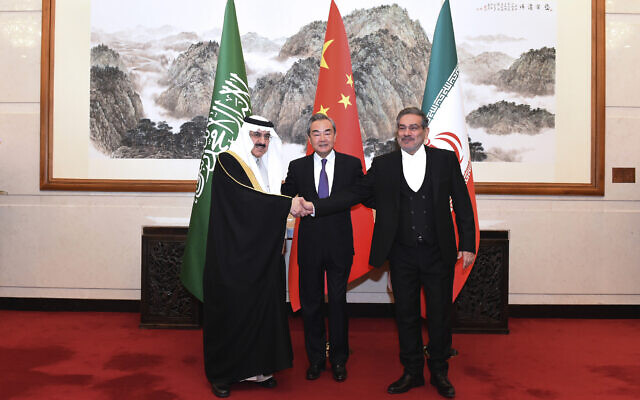
In this photo released by Xinhua news agency, Ali Shamkhani, secretary of Iran’s Supreme National Security Council, shakes hands with Saudi national security adviser Mussad bin Mohammad al-Aiban, left, as China’s most senior diplomat Wang Yi , looking at a photo, center, during a closed meeting held in Beijing, March 11, 2023. (Luo Xiaoguang/Xinhua via AP)
Lapid’s partner in the previous government, Naftali Bennett, also joined in the act: “The world and the countries in the region see Israel divided with a non-functional government focused on serial self-destruction. And then those countries Chose a side.”
On Friday, a senior official at Netanyahu’s entourage in Rome blamed the Saudi-Iranian rapprochement on projected “American and Israeli weakness” under the Biden administration and the Bennett-Lapid government.
Bipartisan betrayal
Perceived US weakness was almost certainly a factor in the move, but it didn’t just emanate from the Biden White House.
A Prominent Saudi Journalist Finds Seeds of Detente Going Back to Barack Obama’s Administration Write that “Washington and the West have not been serious about the security of the region since the conclusion of the Iranian nuclear deal in 2015.”
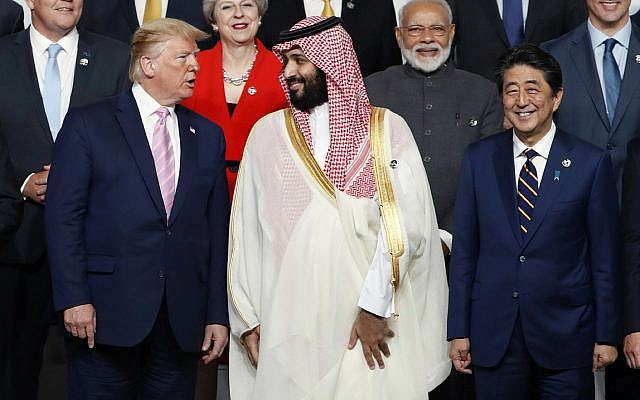
Example: Then-US President Donald Trump, left, talks with Saudi Arabia’s Crown Prince Mohammed bin Salman during a photo session at the G20 leaders’ summit in Osaka, Japan, June 28, 2019. (Kim Kyung-hoon/Pool Photo via AP)
His successor Donald Trump, although well received in the Gulf, further undermined Saudi confidence. It decided not to attack Iran in September 2019 in response to a drone and missile attack on a major Saudi oil processing facility. Once Riyadh understood that there would be no US retaliation, it approached Iran, understanding that it had to avoid conflict it would not fight on its own.
But Trump also developed close personal ties with Gulf leaders, including Saudi de facto ruler Crown Prince Mohammed bin Salman.
Biden is a different story entirely.
“We [are] In fact they have to pay the price, and in fact they have to be made untouchables,” Biden said while campaigning for president. “There is very little social redemptive value in the current government in Saudi Arabia.”
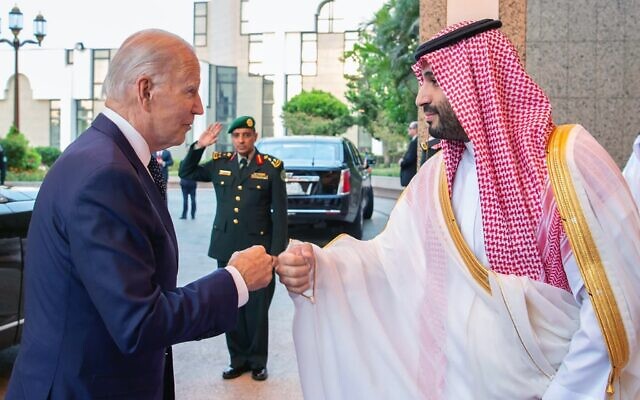
In this photo released by the Saudi Press Agency (SPA), Saudi Crown Prince Mohammed bin Salman, right, greets President Joe Biden with a fist bump after his arrival in Jeddah, Saudi Arabia, Friday, July 15, 2022 . (Saudi Press Agency via AP)
Shortly after taking office in January 2021, the 46th US President has taken some steps towards fulfilling his promise. He publicly released an intelligence report that pointed the finger at Saudi Crown Prince Mohammed bin Salman (also known as MBS) for directly authorizing the murder of Saudi journalist and Washington Post columnist Jamal Khashoggi. Biden also rolled back US support for a Saudi-led air campaign in Yemen amid an insurgency over civilian casualties and took the Iran-backed Houthis off a US terrorist list.
“You didn’t have to be a diplomat or an intelligence officer to notice the deterioration in Saudi-US relations,” said Meir Ben-Shabbat, who served as national security adviser under Netanyahu and Bennett.
While he did little to stop Saudi Arabia from turning into a pariah, even a trip to Israel after meeting MBS in Jeddah and seemingly shelving a planned review In US–Saudi relations, there remained intense friction between the countries, which helped bring Riyadh and Tehran closer together.
“There is little doubt in my mind that this failure is directly attributable to the Biden administration’s misguided strategy toward the region,” said John Hanna, senior fellow at the Jewish Institute for National Security of America and former national security adviser to US Vice President Dick Cheney. .
“Had Washington not spent the better part of two years implementing the policies, it had the predictable effect of shattering MBS’s confidence and trust in America’s credibility as its most important strategic partner,” he said. He continued, “I suspect that the events of last week in Beijing would have played out exactly the way they did.

Loyalists to Yemen’s Houthis chant during a rally marking the seventh anniversary of the Saudi-led coalition’s intervention in their country, in the capital Sanaa, March 26, 2022. (Mohammed Huwais / AFP)
Moran Zaga, an expert on the Gulf region at Mitavim – The Israeli Institute for Regional Foreign Policies, agreed, saying that it was clear from the beginning of the Biden administration that “there is a personal, moral and also diplomatic relationship with the Saudis.”
“The Americans effectively pushed the Saudis to do this,” he said. “What choice was he left with?”
They had no choice but to talk to Tehran, but the decision to bring in China as a mediator was seen by some as a jibe at the US. Iran and Saudi Arabia have been meeting in Iraq and Jordan for years, and they have had no pressure to go to Beijing to talk.
While many experts see China’s involvement as a dangerous sign of the US being replaced in the region, the Saudis are unlikely to shut the door on the US just yet.
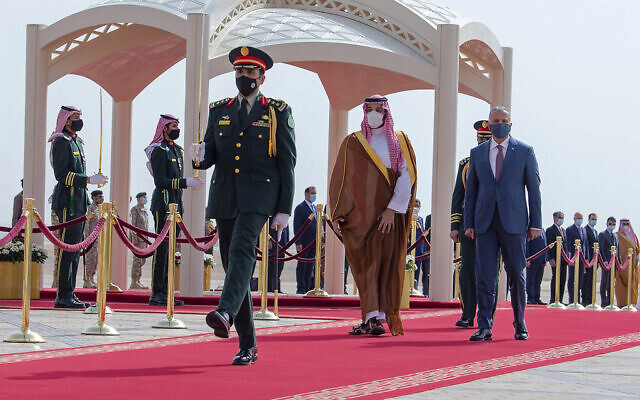
Saudi Crown Prince Mohammed bin Salman, center right, with Iraqi Prime Minister Mustafa al-Kadhimi upon their arrival at Riyadh International Airport in Saudi Arabia on March 31, 2021. Kadhimi visited Saudi Arabia shortly before the first round of direct talks held in April. Baghdad between regional rivals Saudi Arabia and Iran. (Bandar Aljaloud/Saudi Royal Palace via AP, File)
That’s because Riyadh can still count on a massive US military presence in the region, which with dozens of bases and thousands of personnel is still far ahead of the Chinese in the Gulf. By turning to China for talks, the Saudis may be trying to remind Americans of their historic security alliance with the kingdom, indicating their unhappiness with recent developments.
“It is a finger in the eyes of the Americans,” an Israeli official told The Times of Israel.
reality check
The other side of the accusations flying from both sides of the political spectrum – that the Saudi-Iran détente is a result of Israeli policy – is a more complex question.
“This is not Israel’s failure,” argued Alex Grinberg, an Iran expert at the Jerusalem Institute for Security and Strategy think tank. “It has nothing to do with Israel.”
Ben-Shabbat, who now heads the Institute for Zionist Strategies, would not say whether any of his former bosses were to blame. “Rather than assigning a grade, I would say that this is a development that heightens the challenges facing the US and its allies in the Middle East.”
However, other experts saw a direct link to the policies of the current government.
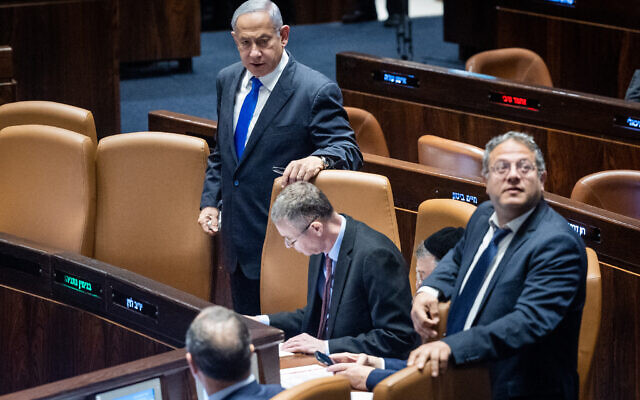
Prime Minister Benjamin Netanyahu (L) with Justice Minister Yariv Levin (C) and National Security Minister Itamar Ben Gvir (R) during a discussion and vote in the Knesset on March 1, 2023. (Jonathan Sindel/Flash90)
An Israeli expert said on condition of anonymity, “With all the chaos in Israel right now, they have given up on any hope that Netanyahu might attack Iran’s nuclear program.” “At least with Lapid, he thought he might have something to prove.”
Even if the tensions are not a response to any particular Israeli policy, it should cause some serious rethinking in Jerusalem.
“It’s a reality check,” offered a European diplomat. “The Israelis are only surprised because the Israelis aren’t paying attention.”
The deal is a reminder that Israel is largely limited in what it can offer. On its own, Israel can provide intelligence and advanced weaponry, but only Iran can give the Saudis the regional stability they want should the US break away.
And while Israel is quietly passing those rewards on to MBS, they have no reason to open themselves up to domestic backlash by signing an open agreement with Israel.

Demonstrators clash with police during a protest against the government’s planned judicial overhaul in Tel Aviv on March 1, 2023. (Eric Marmor/Flash90)
The current climate in Israel is not making the expansion of ties particularly attractive to the Gulf countries. Violence between Israelis and Palestinians is on the rise, and Netanyahu’s far-right allies have a much longer leash.
The bitter fight over judicial reform frustrates even Gulf rulers, who prioritize predictability and stability.
“When Saudi Arabia and the UAE look at Israel now, they say nothing good is going to happen in the near future,” said Joshua Krasna, director of the Center for Emerging Energy Politics in the Middle East.
“If the Israelis themselves are going to be eaten, I think it plays into the Saudi notion that we don’t have to like the Iranians, but we have to make sure we’re not at the top of their list.”
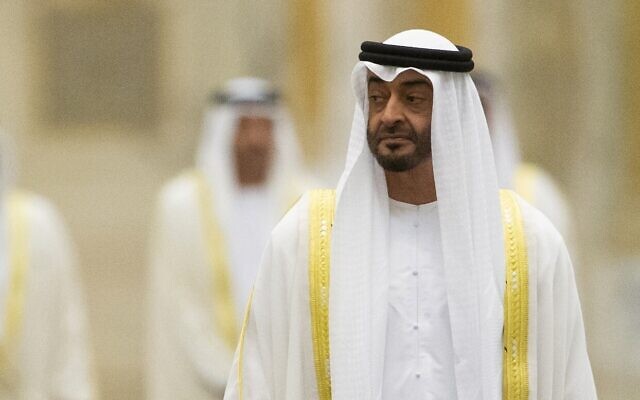
Prince Mohammed bin Zayed Al-Nahyan of the United Arab Emirates in Abu Dhabi, October 15, 2019. (AP Photo/Alexander Zemlianichenko, Poole)
The growing reticence of Emiratis towards Israel should also be a wake-up call. Support for the Abraham Accords is waning in Abu Dhabi, where Netanyahu’s invitation is suspended, the Negev summit is postponed and the United Arab Emirates reportedly cold arms purchases “as long as Netanyahu does not control his government.”
Krasna said that recent conversations with Emirati experts have revealed a fundamental misrepresentation of the Emirates’ motivations on the part of Israel.
“They said the Israelis never understood us,” he said. “He told me, ‘Israel thought the reason we went was because we didn’t care about the Palestinians. We thought we could help the Palestinians more by negotiating rather than by not getting involved.'”
The Palestinian issue is even more important to the Saudi leadership. Senior officials have repeatedly said in recent months that there will be no normalization with Israel without an agreement for a Palestinian state, in addition to their demands from the US.
Meanwhile, as political battles escalate in the Knesset and on Israel’s streets, Netanyahu can forget about extending the Abraham Accords.
“At the moment we are much further away from normalization with the Saudis than we were a few months ago,” Kasna lamented. “I don’t think the Saudis would be interested in giving that kind of award to the current government in Israel.”